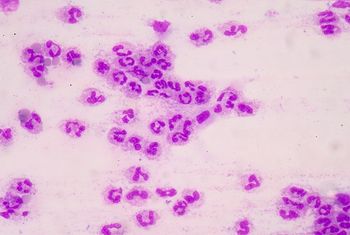
Despite new treatment options with a lower theoretical risk, approximately 40% of patients with HCV experienced a drug-drug interaction.

Despite new treatment options with a lower theoretical risk, approximately 40% of patients with HCV experienced a drug-drug interaction.

The first strain of influenza virus a person is exposed to in early childhood impacts their ability to fight flu for life. The phenomenon is known as antigenic imprinting.

The US Department of Health and Human Services announced that it is expanding an existing collaboration with Regeneron Pharmaceuticals in order to pursue a treatment for the 2019 novel coronavirus.

Andrea L. Cox, MD, PhD, comments on the future of HCV vaccine development efforts in light of the 2019 trial which did not prevent chronic infection.

An article concludes that there has been human-to-human transmission among close contacts since the middle of December 2019.

NIAID and partner organizations have discontinued HIV vaccination in a South Africa based experimental trial.

Gilead Sciences is collaborating with Chinese, US, and global health officials in order to investigate the safety and efficacy of their investigational antiviral compound remdesivir against the novel coronavirus.

In Medicaid data spanning a decade, more than a quarter of prescriptions were not associated with a clinician visit.

The US Centers for Disease Control and Prevention Advisory Committee on Immunization Practices has released the 2020 Recommended Immunization Schedule for adults.

A new study provides evidence that more needs to be done to meet the needs of children in rural Zimbabwe who are exposed to HIV.

A phase 1 clinical trial sponsored by the National Institute of Allergy and Infectious Diseases will test the safety and effectiveness of monoclonal antibody CIS43LS used as prophylaxis against malaria.

According to new data, the prevalence of birth defects potentially related to Zika virus infection increased fourfold from January through March 2017 when compared with January to March 2016.

The CDC’s Advisory Committee on Immunization Practices have updated vaccine recommendations to allow interchangeable use of Tdap and Td in some cases.

A new study provides evidence that there was no change in herd immunity among more than 34,000 students in Australia with moderate to high vaccination rates.

The CDC reports transgender women diagnosed with HIV are less likely to receive partner services, compared to other people receiving the same diagnosis.

It appears that treatment with vitamin C, thiamine, and hydrocortisone does not significantly improve time alive and time free of vasopressor administration among patients with sepsis.

A study has revealed the ways Mycoplasma genitalium competes with host organism cells for essential metal nutrients.

Public Health England reported the promising news that new HIV transmission in the UK continued to decline in 2018.

The case has been confirmed in an individual in Washington State.

A new study examining conjugate vaccine trial data has concluded that typhoid incidence estimates should be adjusted for the proportion of cases which go undetected due to lack of blood cultures.

Investigators of a new analysis detail how Ebola case definitions became increasingly complex and discordant during the 6-month period in the countries surrounding the DRC.

Sepsis may be associated with 1 in 5 deaths globally, twice as many as some previous estimates established.

A new study has found that in Tennessee, less than 2% of providers account for 25% of pediatric antibiotic prescriptions, with the highest number of prescriptions coming from providers who graduated from medical school prior to 2000.

A new study demonstrates that some HIV "hotspots" transfer very few infections to nearby communities and instead receive more infections from outside.

A new commentary argues that given the strong safety and efficacy profile of TDF/FTC, there is not sufficient benefit to warrant changing clinician emphasis to TAF/FTC.

Investigators of a recently published manuscript surveyed hospitals participating in the Michigan Hospital Medicine Safety Consortium in order to evaluate contemporary practices and needs related to antibiotic stewardship.

A new study explored the differential epidemiology of VRE colonization in nursing homes, found E faecium is carried longer and more strongly associated with device use when compared with E faecalis.

An international study offers new insight on cases of influenza hospitalization among pregnant women.

A study comparing immunogenicity, safety, and interchangeability of JENVAC to an SA 14-14-2 strain derived vaccine has found JENVAC offers statistically higher immunological measures.

A new study provides detailed description of newly identified BoDV-1 induced encephalitis cases, establishing the infection as a potentially lethal zoonosis which can impact immunocompromised and healthy individuals.